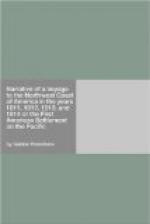On the 22d, we began to see some pines on the ridge of the neighboring hills; and at evening we encamped under trees, a thing which had not happened to us since the 12th.
On the 23d, toward 9, A.M., we reached the trading post established by D. Stuart, at the mouth of the river Okenakan. The spot appeared to us charming, in comparison with the country through which we had journeyed for twelve days past: the two rivers here meeting, and the immense prairies covered with a fine verdure, strike agreeably the eye of the observer; but there is not a tree or a shrub to diversify the scene, and render it a little less naked and less monotonous. We found here Messrs. J. M’Gillivray and Ross, and Mr. O. de Montigny, who had taken service with the N.W. Company, and who charged me with a letter for his brother.
Toward midday we re-embarked, to continue our journey. After having passed several dangerous rapids without accident, always through a country broken by shelving rocks, diversified with hills and verdant prairies, we arrived, on the 29th, at the portage of the Chaudieres or Kettle falls. This is a fall where the water precipitates itself over an immense rock of white marble, veined with red and green, that traverses the bed of the river from N.W. to S.E. We effected the portage immediately, and encamped on the edge of a charming prairie.
We found at this place some Indians who had been fasting, they assured us, for several days. They appeared, in fact, reduced to the most pitiable state, having nothing left but skin and bones, and scarcely able to drag themselves along, so that not without difficulty could they even reach the margin of the river, to get a little water to wet their parched lips. It is a thing that often happens to these poor people, when their chase has not been productive; their principal nourishment consisting, in that case, of the pine moss, which they boil till it is reduced to a sort of glue or black paste, of a sufficient consistence to take the form of biscuit. I had the curiosity to taste this bread, and I thought I had got in my mouth a bit of soap. Yet some of our people, who had been reduced to eat this glue, assured me that when fresh made it had a very good taste, seasoned with meat.[AC] We partly relieved these wretched natives from our scanty store.
[Footnote AC: The process of boiling employed by the Indians in this case, extracts from the moss its gelatine, which serves to supply the waste of those tissues into which that principle enters; but as the moss contains little or none of the proximates which constitute the bulk of the living solids and fluids, it will not, of course, by itself, support life or strength.—ED.]




